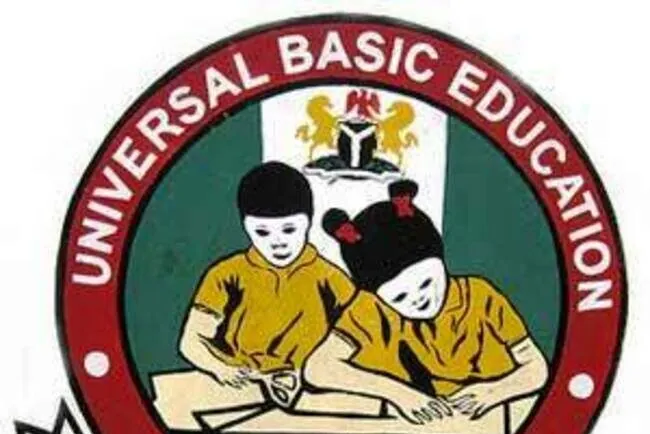

The Federal Government has come clear by charging the 36 state governments and Federal Capital Territory to take full responsibilities of effective implementation of Universal Basic Education programme in the country.
Minister of Education, Dr. Maruf Olatunji Alausa, who stated this in Abuja, clarified that the implementation of the UBE programme is entirely the responsibility of States, noting however, that this requires a strong collaboration with all relevant agencies to address the various challenges facing the basic education sub-sector.
He spoke at a three-day meeting of the Universal Basic Education Commission (UBEC) management with executive chairmen of State Universal Basic Education Boards from the 36 states and FCT in Abuja on Monday.
The meeting was organised under the theme “Strengthening Collaboration for Quality Basic Education Delivery in Nigeria.”
Speaking against the backdrop of the fact that education is on the concurrent legislative list with primary and secondary schools directly under the purview state governments, the Minister urged the various state governments to reevaluate existing strategies and identify innovative approaches to implementing basic education in Nigeria.
ALSO READ: UNICEF vows to sustain support for Nigeria despite funding hitches
“Therefore, I encourage you to reevaluate existing strategies and identify innovative approaches to implementing basic education. This includes exploring alternative funding sources and fostering collaboration to ensure that every Nigerian child receives quality education.
“I want to assure you that the Federal Government will continue to partner and support States in ensuring that necessary reforms are carried out in the basic education sub- sector, and that such reforms are effectively implemented by States to meet the aspirations of the country,” he stated.
The Minister who was represented by his Senior Special Assistant (SSA), Dr. Ismaila Adiatu, emphasised the government’s dedication to addressing the growing crisis of out-of-school children in Nigeria.
He reiterated commitment towards enhancing the delivery of quality basic education across the country while expressing the determination of President Bola Ahmed Tinubu led administration to transform education.
Alausa said President Tinubu has accordingly directed all stakeholders in the basic education sub-sector to work towards returning children back to the classroom thus decreasing the number of out-of-school children.
“I would like to assure you of the Federal Government’s commitment to promoting quality education to inspire renewed hope, with strong emphasis on prioritising qualitative basic education, which is recognised as the most vital segment of the education sector.
“The development of this foundational level is essential for the positive impact of the other tiers of the educational system and its contribution to overall national development.
“The Federal Ministry of Education is, therefore, committed to improving teacher quality, enhancing the school environment, ensuring the availability of adequate instructional materials, and implementing an effective quality assurance evaluation system.
“We are also focused on strengthening collaboration with all relevant stakeholders to develop result-oriented strategies aimed at reducing the growing number of out-of-school children,” the minister added.
He said a committee had been set up to outline the process for categorising schools in Nigeria to identify areas where urgent interventions are needed.
“These efforts are designed to prepare Nigerian youths for the 21st-century economy, in line with Mr. President’s initiative of ‘Education for Renewed Hope.'”
He further called on participants to reevaluate existing strategies and identify innovative approaches to implementing basic education, including exploring alternative funding sources and fostering collaboration to ensure that every Nigerian child receives quality education.
The Executive Secretary of UBEC, Hajiya Aisha Garba, said the gathering was a testament to its collective commitment to ensuring that every Nigerian child has access to quality basic education, regardless of the education programme in Nigeria.
“We must prioritise our society-based education by ensuring effective collaboration at national and state levels, within the education sector and beyond.
“This workshop provides us with a unique opportunity to collectively evaluate our progress so far, identify challenges, and chart a new pathway towards achieving our shared goal of an effective basic education system in Nigeria. While I have knowledge over the decades, it is still imperative that we address the most essential issues.
“Nigeria still has poor quality of education, especially at the basic level. We must work together to address these challenges in financing basic education, infrastructure, quality of education, ensuring the relevance and accessibility of learning materials, addressing challenges of teachers, and working together to improve the social infrastructure of an inclusive teaching and learning environment,” she added
Speaking on behalf of the chairmen, Prof. Adaramaja Shehu, congratulated the Executive Secretary on her appointment, while appreciating the commitment of her management team for their expected support in the discharge of their responsibilities.
The Chief of Army Staff (COAS), Lt.-General Olufemi Oloyede, has reiterated the commitment of the…
“We have to invest heavily in education, in technology, in innovation, so that we can…
Nigeria is already the world’s largest producer of cassava, but successive administrations have struggled to…
The House of Representatives on Thursday unveiled plans to investigate the recurring security lapses in…
In a major step towards unlocking the full economic potential of cassava, the National Agricultural…
Aspirants seeking to contest Senate seats on the PDP platform are to pay N500,000 for…
This website uses cookies.